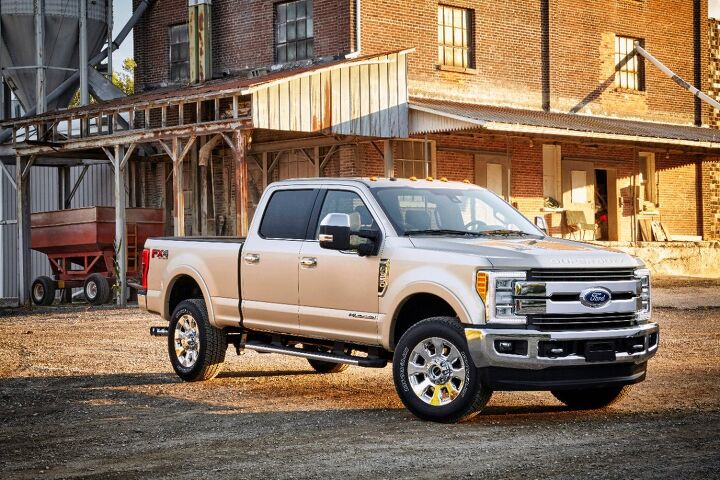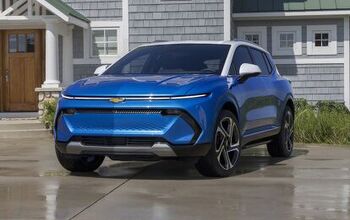Lawsuit Claims Ford 'Rigged' Its Diesel Truck Engines

Are you an automaker that’s currently producing, or has ever produced, a diesel engine? If so, the odds are pretty good you’ll eventually be sued over its existence. A new lawsuit by truck owners, filed on Wednesday, alleges Ford Motor Company installed emissions-cheating software in F-250 and F-350 Super Duty trucks — built between 2011 and 2017 — to ensure they passed federal testing.
At this point, all of the Detroit Three manufacturers have been accused of some form of diesel deceit. Which makes us wonder how warranted these lawsuits are. Volkswagen’s scandal started when an independent source tipped off U.S. regulatory agencies, but these truck cases frequently begin as class-action suits on somewhat specious grounds.
Further complicating the issue is the fact that many diesel systems are intentionally designed to burn off accumulated particulates during a filter-regeneration process before returning to normal operations. In this way, the software responsible for regulating diesel-particulate filters (DPFs) could theoretically be confused with a defeat device. However, the lawsuit, filed by automotive class-action heavyweight Hagens Berman in U.S. District Court for the Eastern District of Michigan, makes no obvious reference to DPFs.
According to Bloomberg, the suit against Ford assessed fuel consumption over time. The group pursuing it claims to have conducted rigorous testing to support its claim of the F-250 and F-350 emitting 50 times the legal limit for nitrogen oxide pollutants.
“Emissions are routinely as high as five times the standard,” the lawsuit read, dropping the insult that the Super Duty trucks should referred to as “Super Dirty.” The suit includes 58 alleged violations of state consumer law, false advertising, and racketeering claims.
Maybe we’re just burnt out after the string of lawsuits that followed Volkswagen’s emissions scandal, but it’s clever stuff like the Super Dirty pun that makes us wonder how seriously we should take the accusations. Ford is at least the fifth carmaker accused of diesel cheating in the United States, which raises questions about the effectiveness of diesel technology and the ability of various groups to effectively measure emissions. We’re going to wait until the Environmental Protection Agency chimes in before making any assumptions.
The lawsuit also names German auto supplier Robert Bosch as a defendant. Bosch said allegations against the company “remain the subject of investigations and civil litigation,” adding that it will take all claims of diesel software manipulation seriously. Bosch faced similar accusations in cases against VW, Fiat Chrysler, and General Motors.
Ford’s team said the automaker will issue a comment on the matter soon.
[Image: Ford Motor Co.]

A staunch consumer advocate tracking industry trends and regulation. Before joining TTAC, Matt spent a decade working for marketing and research firms based in NYC. Clients included several of the world’s largest automakers, global tire brands, and aftermarket part suppliers. Dissatisfied with the corporate world and resentful of having to wear suits everyday, he pivoted to writing about cars. Since then, that man has become an ardent supporter of the right-to-repair movement, been interviewed on the auto industry by national radio broadcasts, driven more rental cars than anyone ever should, participated in amateur rallying events, and received the requisite minimum training as sanctioned by the SCCA. Handy with a wrench, Matt grew up surrounded by Detroit auto workers and managed to get a pizza delivery job before he was legally eligible. He later found himself driving box trucks through Manhattan, guaranteeing future sympathy for actual truckers. He continues to conduct research pertaining to the automotive sector as an independent contractor and has since moved back to his native Michigan, closer to where the cars are born. A contrarian, Matt claims to prefer understeer — stating that front and all-wheel drive vehicles cater best to his driving style.
More by Matt Posky
Latest Car Reviews
Read moreLatest Product Reviews
Read moreRecent Comments
- Alan Where's Earnest? TX? NM? AR? Must be a new Tesla plant the Earnest plant.
- Alan Change will occur and a sloppy transition to a more environmentally friendly society will occur. There will be plenty of screaming and kicking in the process.I don't know why certain individuals keep on touting that what is put forward will occur. It's all talk and BS, but the transition will occur eventually.This conversation is no different to union demands, does the union always get what they want, or a portion of their demands? Green ideas will be put forward to discuss and debate and an outcome will be had.Hydrogen is the only logical form of renewable energy to power transport in the future. Why? Like oil the materials to manufacture batteries is limited.
- Alan As the established auto manufacturers become better at producing EVs I think Tesla will lay off more workers.In 2019 Tesla held 81% of the US EV market. 2023 it has dwindled to 54% of the US market. If this trend continues Tesla will definitely downsize more.There is one thing that the established auto manufacturers do better than Tesla. That is generate new models. Tesla seems unable to refresh its lineup quick enough against competition. Sort of like why did Sears go broke? Sears was the mail order king, one would think it would of been easier to transition to online sales. Sears couldn't adapt to on line shopping competitively, so Amazon killed it.
- Alan I wonder if China has Great Wall condos?
- Alan This is one Toyota that I thought was attractive and stylish since I was a teenager. I don't like how the muffler is positioned.


































Comments
Join the conversation
stupid really. all you've got to do is run these engines on ethanol. we've got plenty and can make more. they run cleaner and make more torque and power, and it's cheaper. what's not to like? you just need a cetane enhancer. all diesel engines in brazil run on ethanol. it can be hydrous too, with 5% water, which makes it even better and cheaper since you don't have to bother taking the water out.
Hagens Berman are just the automotive equivalent of scumbag ambulance chasing personal injury lawyers. Maybe reason will prevail, and this will get tossed out of court. Bwahahahaha!